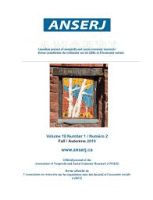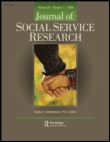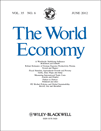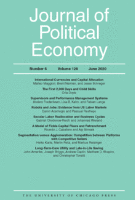
Canadian Journal of Nonprofit and Social Economy Research
Scope & Guideline
Illuminating pathways to effective social change.
Introduction
Aims and Scopes
- Nonprofit Sector Analysis:
The journal examines the structure, function, and impact of nonprofit organizations, focusing on their role in society, governance, and service delivery. - Social Innovation:
A core focus is on social innovation as a mechanism for addressing social challenges, including studies on best practices and frameworks for implementation. - Community Engagement and Empowerment:
Research often emphasizes community-based approaches, highlighting the importance of local engagement in fostering social change and economic development. - Interdisciplinary Methodologies:
Utilizing a variety of research methodologies, including qualitative, quantitative, and mixed methods, to provide comprehensive insights into the social economy. - Policy Development and Advocacy:
The journal contributes to policy discussions and advocacy efforts related to nonprofit management, funding, and the broader social economy.
Trending and Emerging
- Indigenous Perspectives and Issues:
There is a growing emphasis on Indigenous studies, addressing topics such as housing, food sovereignty, and empowerment, reflecting a commitment to inclusivity and social justice. - Circular Economy and Sustainability:
Research on circular economy practices and their intersection with social enterprises is trending, highlighting the importance of sustainable practices within the social economy. - Mental Health and Social Inclusion:
Increasing attention is being paid to the role of nonprofits in promoting mental health and social inclusion, particularly in the context of marginalized communities. - Impact Measurement and Evaluation:
Emerging themes focus on innovative approaches to measuring social impact and effectiveness of nonprofit programs, responding to calls for accountability and transparency. - Community Resilience and Adaptation:
Research exploring community resilience, particularly in response to crises such as COVID-19, is becoming increasingly relevant, emphasizing the adaptive capabilities of nonprofits.
Declining or Waning
- Traditional Nonprofit Models:
There seems to be a waning interest in studies focused on traditional nonprofit models, as research increasingly prioritizes innovative and adaptive approaches to social issues. - Philanthropy as a Sole Solution:
The discourse around philanthropy as the primary solution to social problems is diminishing, with a growing emphasis on systemic change and community-driven initiatives. - Corporate Social Responsibility (CSR):
Research centered solely on CSR practices is less frequent, as the journal shifts towards more holistic discussions that integrate social economy perspectives. - Single-issue Focus:
There is a decline in research that addresses single-issue areas without considering the broader social context, as interdisciplinary approaches gain traction. - Global North Perspectives:
Studies that focus exclusively on the Global North, particularly Canada and the U.S., are becoming less common, with a noticeable increase in research highlighting Global South contexts.
Similar Journals

UCJC Business and Society Review
Promoting Open Access to Transformative ResearchUCJC Business and Society Review is a prominent open-access journal published by UNIV CAMILO JOSE CELA in Spain, focusing on the interdisciplinary exploration of business, management, and socio-economic issues. Since its inception in 2018, this journal has aimed to foster critical dialogue among researchers, professionals, and students interested in the complex relationship between business practices and societal impact. With its recent classification in the Q4 quartile across various categories, including Business, Management and Accounting, Economics, and Finance, the journal serves as a platform for disseminating innovative research and insights that can influence policy and business strategy. Despite its ranking, the journal continues to provide valuable contributions to the field, promoting scholarly work that challenges conventional perspectives. The commitment to an open access model ensures that research is widely available, enhancing its visibility and impact within the academic community and beyond. For those looking to stay informed about emerging trends and pivotal discussions in business and society, UCJC Business and Society Review presents an essential resource.

Journal of Economy Culture and Society
Innovating Academic Discourse in Economy, Culture, and SocietyThe Journal of Economy Culture and Society, with the ISSN 2602-2656 and E-ISSN 2645-8772, is a pioneering Open Access journal published by the esteemed ISTANBUL UNIV, METHODOLOGY & SOCIOLOGY RESEARCH CENTER. Since its inception in 1960, the journal has served as a vital platform for disseminating high-quality research in the fields of economy, culture, and societal dynamics, reflecting the interwoven nature of these disciplines. Located in the cultural and academic heart of Turkey, at the CENTRAL CAMPUS, ISTANBUL 34452, the journal fosters engagement among researchers, professionals, and students through its commitment to accessible and impactful scholarship. With a broad scope that examines contemporary social issues and economic trends, it aims to contribute significantly to the understanding of societal transformations and cultural exchanges. The Journal of Economy Culture and Society not only encourages innovative discourse but also supports the dissemination of knowledge to a global audience, underscoring its importance in the academic community.

JOURNAL OF SOCIAL SERVICE RESEARCH
Innovating social service insights for impactful change.JOURNAL OF SOCIAL SERVICE RESEARCH, published by Routledge Journals, Taylor & Francis Ltd, is a leading platform for disseminating cutting-edge research in the fields of social sciences, social work, and sociology. With a history spanning from 1978 to 2024, this journal serves as a vital resource for academics, practitioners, and students seeking to explore the complex dynamics of social services and their impact on communities. The journal holds a commendable reputation, ranking in the second quartile (Q2) in Social Sciences and Sociology and Political Science, and third quartile (Q3) in Social Work, reflecting its significant influence as evidenced by its percentile rankings in Scopus. While the journal does not offer open access, it is widely recognized for its rigorous peer-review process and commitment to advancing knowledge in social service practice and policy. As the landscape of social issues continues to evolve, JOURNAL OF SOCIAL SERVICE RESEARCH remains an essential conduit for innovative insights and empirical findings, fostering informed decision-making and scholarly debate.

Voluntas
Empowering Scholars to Shape Societal ImpactVoluntas, published by Springer, is a leading international journal committed to advancing the fields of Business and International Management, Geography, Planning and Development, Public Administration, Sociology, and Political Science. With an impressive impact factor and ranking in the Q1 category across multiple disciplines, the journal serves as a vital resource for scholars and practitioners seeking to explore the intersections of voluntary action, social responsibility, and public policy. Covering a converged period from 1990 to 2024, Voluntas not only publishes high-quality empirical research but also seeks to disseminate theoretical insights that promote understanding and engagement with pressing societal issues. Researchers, professionals, and students alike will find a wealth of knowledge that enhances their understanding of the complexities of voluntary organizations and their impact on the world today. For access options and more information, please visit the publisher's website.

SOCIAL ALTERNATIVES
Exploring Innovative Solutions for Community DynamicsSOCIAL ALTERNATIVES, published by SOCIAL ALTERNATIVES, is a vital interdisciplinary journal that delves into social issues and the dynamics of community life, exploring innovative solutions and diverse perspectives. With an ISSN of 0155-0306 and an E-ISSN of 1836-6600, the journal serves as a platform for researchers, professionals, and students dedicated to advancing the understanding of societal change and alternative frameworks for action. While it is not an open-access journal, it plays a significant role in academic discourse, fostering critical thought and collaboration among scholars focused on social theory, community development, and public policy. Located at the University of Sunshine Coast in Maroochydore, Australia, SOCIAL ALTERNATIVES aims to connect academia with practical outcomes, emphasizing the relevance of social research in addressing contemporary challenges.

International Review on Public and Nonprofit Marketing
Shaping the Future of Nonprofit Marketing StrategiesThe International Review on Public and Nonprofit Marketing, published by SPRINGER HEIDELBERG, stands as a pivotal resource in the fields of marketing, public administration, and nonprofit management. With an ISSN of 1865-1984 and an E-ISSN of 1865-1992, this journal aims to disseminate innovative research that fosters understanding in both public and nonprofit marketing domains. Since its inception in 2001, the journal has provided a platform for scholarly dialogues, particularly between 2009 and 2024, consistently ranking in the Q2 category within both Economics and Econometrics and Marketing. Its Scopus rankings further underscore its significance, with notable standings in the 66th percentile for Economics and Econometrics and the 48th percentile in Marketing. Although it does not offer open access options, the journal's rigorous peer-review process ensures that readers benefit from high-quality research that addresses the complexities and evolving challenges faced by public and nonprofit sectors. As such, this journal is indispensable for researchers, professionals, and students eager to contribute to and learn from the latest advancements and discussions in these critical fields.

WORLD ECONOMY
Exploring the dynamics that shape our world economy.WORLD ECONOMY is a premier academic journal published by Wiley, renowned for its rigorous peer-reviewed research in the fields of economics, finance, accounting, and political science. Established in 1977, the journal has consistently contributed to the advancement of knowledge, reflected in its strong standing across various category quartiles, notably achieving Q1 in Accounting and Political Science, and ranking in the top quartile in its respective disciplines as of 2023. With an audience that spans researchers, professionals, and students, WORLD ECONOMY publishes impactful articles that explore critical issues affecting the global economy. Although it is not an open-access publication, readers have access options to engage with cutting-edge research that addresses both theoretical and practical aspects of world economic trends. The journal's commitment to excellence is further underscored by its impressive Scopus rankings, situating it among the top journals in the social sciences arena. For anyone keen on deepening their understanding of the dynamics shaping our economic landscape, WORLD ECONOMY remains an indispensable resource.

JOURNAL OF POLITICAL ECONOMY
Fostering critical discussions for a deeper understanding of economic theories.JOURNAL OF POLITICAL ECONOMY, published by University of Chicago Press, stands as a premier outlet for scholarly discourse in the realms of economics and econometrics. With an impressive impact factor and a Q1 category ranking in 2023, this journal ranks #16 out of 716 in its field, placing it amongst the most influential publications, appealing to researchers and professionals alike. Since its inception in 1969, this journal has provided a platform for rigorous analysis and innovative methodologies that shape economic thought. Although currently not open access, the journal's extensive archival resources and contemporary research articles are indispensable for students and academics seeking to engage with foundational and cutting-edge economic theories. With converged years extending up to 2024, it continues to foster critical discussions essential for understanding political economy's complexities, making it a vital resource for anyone dedicated to advancing our knowledge in this pivotal field.

Economics Ecology Socium
Empowering global dialogue on eco-socioeconomic challenges.Economics Ecology Socium is an impactful open-access journal focused on the intersection of economic systems, ecological sustainability, and societal dynamics. Published by Dr. Viktor Koval, this journal aims to foster interdisciplinary research that addresses contemporary challenges in environmental economics and social policies. Since its inception in 2017, Economics Ecology Socium has become a vital platform for scholars, practitioners, and students to disseminate novel insights and data-driven findings. With a commitment to advancing eco-socioeconomic knowledge, the journal encourages contributions that promote sustainability and improve decision-making processes across various sectors. Its open-access model allows for broad dissemination of research, making crucial knowledge available to a global audience. With an ISSN of 2616-7107 and an E-ISSN of 2786-8958, Economics Ecology Socium is positioned to contribute meaningfully to the global dialogue on economic and ecological issues, ensuring that research reaches those who need it most.

China Nonprofit Review
Advancing the Dialogue on Nonprofit Innovation in ChinaChina Nonprofit Review, published by TSINGHUA UNIVERSITY PRESS, serves as an essential platform for the dissemination of research and discussion surrounding the nonprofit sector in China and its global implications. With its ISSN 1876-5092 and E-ISSN 1876-5149, this journal covers a wide spectrum of topics relevant to the fields of Economics, Sociology, and Political Science, though it features a Category Quartile ranking of Q4 across various disciplines as of 2023. Despite its nascent stages in a competitive landscape, the journal seeks to elevate the discourse around nonprofit management and policy by enriching the academic community with original research and critical analyses. Researchers, professionals, and students can benefit from the insights into the evolving challenges and innovations within the nonprofit realm, fostering an understanding that transcends borders. As the nonprofit landscape continues to expand and adapt, China Nonprofit Review is positioned to contribute significantly to scholarly conversations and practical applications in this dynamic and impactful field.